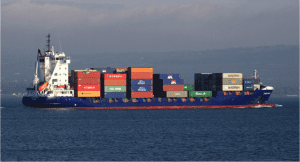A recent tentative agreement between the International Longshore and Warehouse Union (ILWU) and the Pacific Maritime Authority (PMA) offers hope of an end to the months of labor strife that has been plaguing the west coast ports. However, shipping and cargo transport backlogs, freight movement slowdowns, financial losses, and other repercussions continue to linger and affect the freight supply chain. While much of the media focus of late has been on the thousands of containers in temporary ports or mired offshore due to port congestion, the west coast port slowdown also has a human toll as the hundreds of crew members aboard these container ships are stuck at port or waiting offshore well beyond the scheduled duration of their journey.

Nearly two dozen ships were waiting off shore in a backlog at the Long Beach and Los Angeles ports, which handle approximately 40 percent of America’s incoming shipping containers. Their crews, which hail from across the globe, are also waiting and occupy themselves with the customary seafaring duties as well as what leisure activities they can find. These crewmembers, too long at sea, face supply shortages and numerous uncertainties as to when they might return home, and whether or not they will receive additional compensation or overtime pay.
Further up the west coast at Puget Sound in Washington, the story is no better with reports of ships having been anchored offshore for as long as 17 days before unloading at the Port of Tacoma. According to the U.S. Coast Guard’s Vessel Traffic Center in Seattle, many ships had to be diverted to other locations that generally see one or two ships anchored offshore at any given time. Manchester Bay for example, which is a holding location for the Port of Tacoma, had up to an unprecedented five (5) ships anchored there at one time.
A recent article in the Long Beach Press-Telegram brought the news of the Port of Los Angeles’ initiation of a “peel off” program. According to the article, the goal of the program is to “allow containers from major customers to be moved to designated areas where truckers could quickly peel off those containers destined for distribution centers inland.”
While this is a welcome start to the impasse at the ports, this and the tentative ILWU/PMA agreement are unlikely to quickly resolve backlog problems and the current port congestion. Despite this progress, the repercussions of the strike will be with the ports and our national supply chain for months to come.
Stories of entire vertical markets, such as agriculture and a host of consumer goods, are dominating headlines emanating from general news outlets since an uncertain supply chain is impacting them and higher shipping costs and delays are being passed onto the consumer. It’s also important to remember that the crews of these massive container ships have woes of their own; not the least of which is the uncertainty as to when they will see their homes and families next.

